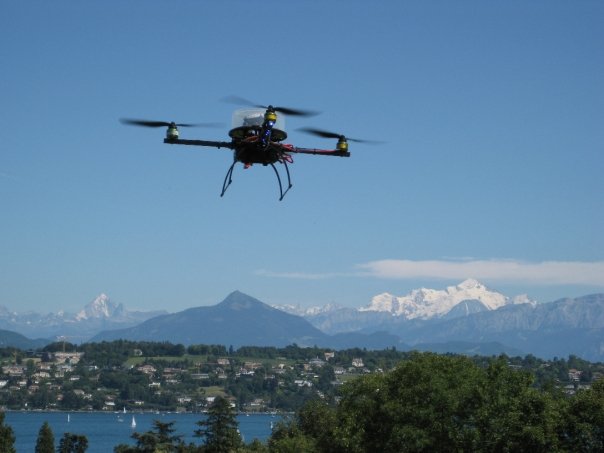Microbee is a four-rotor model helicopter based on the Mikrokopter system design. It's "brains" consists of 8 ARM-based microprocessors connected to various sensors and motors. It's equipped with the latest electronics hardware and is capable of photography, vision guided autonomous navigation as well as normal radio-control flying by a human being. An advanced vision recognition system is currently being developed based on the high performance, low power Texas Instruments OMAP3 platform.
All hardware & electronics is freely available in shops. The software is Open Source. Nothing is commercially-restricted.
Physical Characteristics
- Width: 40 cm (between opposite motors). 66 cm (propeller tip-to-tip).
- Height: 12 cm. (28 cm with HiLander).
- Weight: 700 grams (without battery).
- Flight Duration: ~15 minutes (with 167g/2200 mAh Lipo battery).
Electronics
- FlightCtrl ME v2.0.
- NaviCtrl v1.1 navigation controller.
- MK3Mag magnetic compass module for direction detection.
- MKGPS GPS receiver for navigation.
- MPX-4115A barometric pressure sensor for altitude estimation.
- Spektrum 2.4 GHz R/C receiver.
- Schulze alpha 5.35 35 MHz R/C receiver (modified with PPM output).
- Graupner/JR MX-12s 35 MHz R/C transmitter modified with 3 extra channels (1x 3-position switch, 2x trimpots) and Spektrum DM9 2.4 GHz module installed. Switchable between 35 MHz & 2.4 GHz.
- Radiotronix WI232EUR 868 MHz radio modem with 1/2 wave dipole & yagi antennas. Note that the 1/2 wave dipole antenna works best on-board as it doesn't require a ground-plane and has a reasonably omnidirectional radiation pattern. For long distance communication (up to 4km), a yagi antenna is used at the ground station.
- FB155BC Class-2 Bluetooth module.
- Maxbotix LV-EZ1 ultrasonic range finder.
- LIPO batteries 2200 mAh & 4400 mAh.
- An advanced computer vision system is being prototyped on a BeagleBoard single board Linux computer. It's a latest generation, low-power, embedded processing platform. Basic computer vision algorithms have been implemented on it. The source code is being optimised to off-load the number-crunching to the DSP & GPU processors to achieve real-time vision performance.
- 600 MHz ARM Cortex-A8 with NEON SIMD Co-processor
- 430 MHz TMS320C64x+ DSP (fixed point, six parallel vector units)
- 110 MHz SGX GPU
As the Beagle Board allows connection of keyboard, mouse, and display, it hosts the development toolchain and allows direct coding, compiling, and executing the embedded computer vision algorithms. Once stable, the smaller and lighter Gumstix Overo Water embedded module will be used on-board.
Frame
- MK40 40cm frame with anodized bars
- Canon IXUS-80IS camera
Motors
4x Roxxy 2824-34 Brushless motors
4x BL-Ctrl V1.2 brushless motor controllers
4x EPP1045 Propellers
Video
- Airwave AWM683TX 5.8 GHz 100mW video transmitter with 3.2 dBi WiniZen W6E–UPW–10 dipole antenna
- Airwave AWM682RX 5.8 GHz video receiver with 7 dBi AWM-ANT58-PCB patch antenna
- CM-26N/P CMOS colour camera module
- Sunex DSL209A or DSL215B fisheye lens
On-board Software
- Flight-Ctrl 0.74d modified to control height with a Maxbotix LV-EZ1 ultrasonic range finder (instead of the MPX-4115A barometric pressure sensor).
- Navi-Ctrl 0.15c modified with PID control of sticks.
- In development: Embedded computer vision algorithms running on the Ångström embedded Linux operating system.
Ground Station Software
- Mission Cockpit and English version.
- Ubuntu 9.04.
- OpenCV Based on the work of John Stowers.
- RoboRealm. Was freely available but now only a demo ![]()
- Some parts of the Riddim code.
- Some parts of the MoteCtrl code.
- liblo OSC for fast & efficient interprocess communication.
- Paparazzi ground station integration (under investigation).
Geographical Location
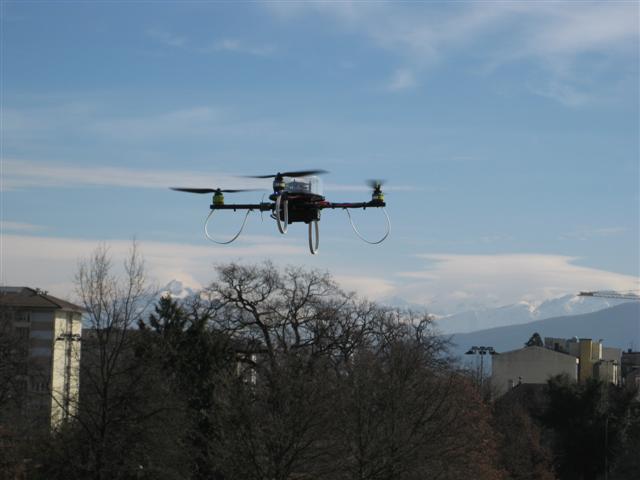
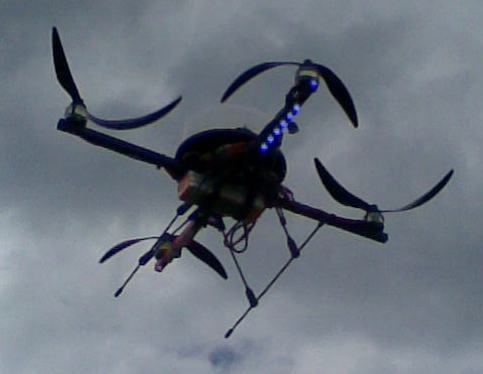
Motodrone 2009
The microbee competed in the Motordrone Challenge in June 2009 and finished in 2nd place. Here are some photos of microbee at the event:
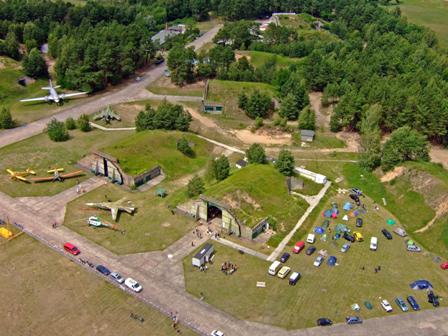 Finowfurt ex-Russian airbase
Finowfurt ex-Russian airbase
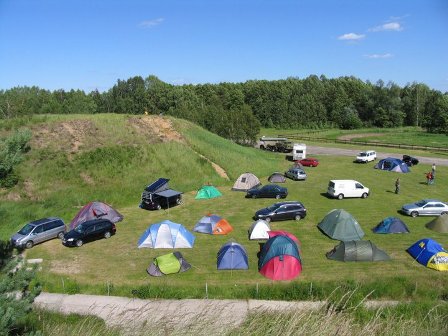 Campsite
Campsite
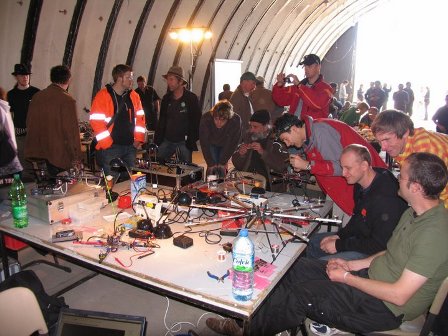 Last minute adjustments (inside an aircraft bunker)
Last minute adjustments (inside an aircraft bunker)
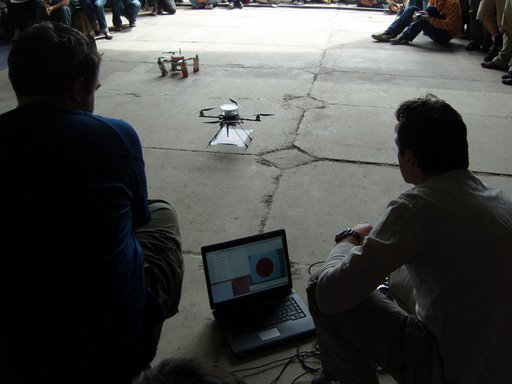 Task 1 - indoor track red circle
Task 1 - indoor track red circle
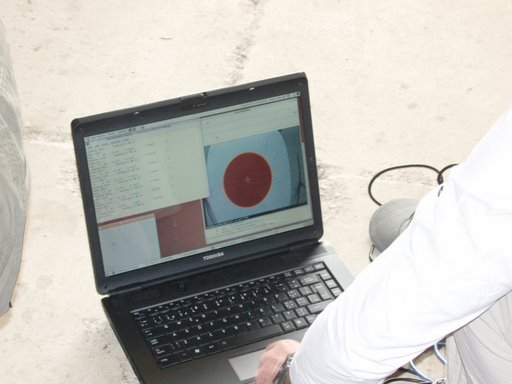 Ground station software
Ground station software
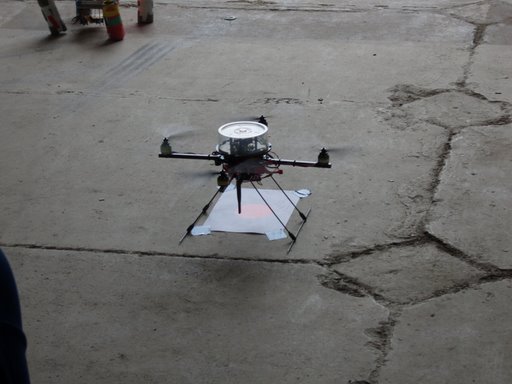 Task 1 - takeoff!
Task 1 - takeoff!
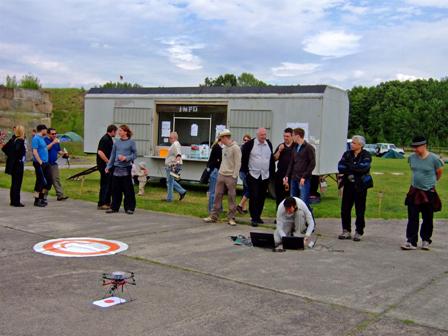 Task 2 - outdoor track
Task 2 - outdoor track

